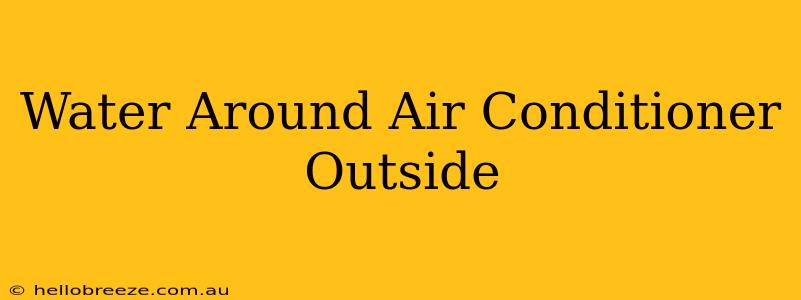Finding water pooling around your outdoor air conditioning unit is a common and often concerning problem. This guide will explore the reasons behind this issue, offer solutions to address existing problems, and provide preventative measures to keep your AC running smoothly and efficiently.
Understanding the Causes of Water Around Your AC Unit
Several factors can lead to water accumulating around your outdoor air conditioning unit. Let's delve into the most common culprits:
1. Condensation: The Usual Suspect
Air conditioners work by removing heat and humidity from your home. This process creates condensation, which is perfectly normal. A properly functioning AC system is designed to drain this condensation away. However, a clogged drain line, a damaged drain pan, or a malfunctioning condensate pump can cause the condensation to overflow, resulting in water around your unit.
2. Frozen Evaporator Coil: A Serious Problem
A frozen evaporator coil, located inside the unit, can restrict airflow and cause ice to melt and drain improperly. This often happens when the air filter is dirty, the airflow is restricted, or the refrigerant is low. A frozen coil can lead to significant water leakage.
3. Leaky Refrigerant Lines: A Critical Issue
Refrigerant leaks are a serious concern. Not only do they impact the cooling capacity of your AC, but they can also introduce moisture into the system. This moisture, combined with the refrigerant, can lead to water pooling around your unit. Refrigerant leaks require professional attention.
4. Clogged Drain Line: A Common Culprit
The condensate drain line is responsible for carrying away the condensed water. If this line becomes clogged with dirt, debris, or algae, the water will back up, overflowing and pooling around the unit. Regular cleaning is crucial to prevent this.
5. Damaged Drain Pan: A Simple Fix (Sometimes)
The drain pan collects condensation before it's routed through the drain line. If the drain pan cracks or becomes damaged, it will leak, resulting in water around your AC unit. Replacing a damaged drain pan is usually a straightforward repair.
6. Blocked Airflow: A Simple Fix
Poor airflow around the outdoor unit can negatively impact its operation. Leaves, debris, or overgrown vegetation can restrict airflow and cause the unit to work harder and produce more condensation. This can easily lead to water pooling. Ensuring proper clearance and regular cleaning around the unit is essential.
Troubleshooting and Solutions
Before calling a technician, try these troubleshooting steps:
- Check the drain line: Locate the drain line and clear any blockages using a garden hose or a specialized drain cleaner.
- Inspect the drain pan: Carefully examine the drain pan for cracks or damage. If damaged, replacement may be necessary.
- Clean the air filter: A clogged air filter restricts airflow, leading to freezing and excessive condensation. Replace or clean the filter regularly (as per manufacturer recommendations).
- Clear the area around the unit: Remove any debris, leaves, or vegetation that might obstruct airflow.
If these steps don't resolve the problem, contact a qualified HVAC technician. Refrigerant leaks and other serious issues require professional attention to avoid further damage and ensure safety.
Preventing Future Water Issues
Regular maintenance is key to preventing water problems around your outdoor AC unit.
- Schedule annual professional maintenance: A qualified technician will inspect your system, clean the coils, check refrigerant levels, and identify potential problems before they escalate.
- Clean the air filter regularly: This is a simple task that can significantly impact your AC's performance and prevent freezing.
- Keep the area around the unit clear: Regularly remove debris and overgrown vegetation.
- Inspect the drain line periodically: Check for blockages and clear them as needed.
By understanding the causes of water around your outdoor AC unit and taking proactive steps, you can ensure your system runs efficiently and avoid costly repairs. Remember, preventative maintenance is always cheaper than reactive repairs!

